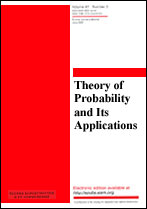|
This article is cited in 17 scientific papers (total in 17 papers)
Fatou's lemma in its classical form and Lebesgue's convergence theorems for varying measures with applications to Markov decision processes
E. A. Feinberga, P. O. Kas'yanovb, Y. Liangc
a Department of Applied Mathematics and Statistics, Stony Brook University, Stony Brook, NY, USA
b Institute for Applied System Analysis, National Technical University of Ukraine ``Igor Sikorsky Kyiv Polytechnic Institute'', Kyiv, Ukraine
c Rotman School of Management, University of Toronto, Toronto, ON, Canada
Abstract:
The classical Fatou lemma states that the lower limit of a sequence of
integrals of functions is greater than or equal to the integral of the lower
limit. It is known that Fatou's lemma for a sequence of weakly converging
measures states a weaker inequality because the integral of the lower limit
is replaced with the integral of the lower limit in two parameters, where the
second parameter is the argument of the functions. In the present paper, we
provide sufficient conditions when Fatou's lemma holds in its classical form
for a sequence of weakly converging measures. The functions can take both
positive and negative values. Similar results for sequences of setwise
converging measures are also proved. We also put forward analogies of
Lebesgue's and the monotone convergence theorems for sequences of weakly and
setwise converging measures. The results obtained are used to prove broad
sufficient conditions for the validity of optimality equations for
average-cost Markov decision processes.
Keywords:
Fatou's lemma, measure, weak convergence, setwise convergence, Markov decision process.
Received: 07.10.2018
Citation:
E. A. Feinberg, P. O. Kas'yanov, Y. Liang, “Fatou's lemma in its classical form and Lebesgue's convergence theorems for varying measures with applications to Markov decision processes”, Teor. Veroyatnost. i Primenen., 65:2 (2020), 338–367; Theory Probab. Appl., 65:2 (2020), 270–291
Linking options:
https://www.mathnet.ru/eng/tvp5358https://doi.org/10.4213/tvp5358 https://www.mathnet.ru/eng/tvp/v65/i2/p338
|


| Statistics & downloads: |
| Abstract page: | 407 | | Full-text PDF : | 336 | | References: | 52 | | First page: | 12 |
|




 Contact us:
Contact us: Terms of Use
Terms of Use
 Registration to the website
Registration to the website Logotypes
Logotypes








 Citation in format
Citation in format 
